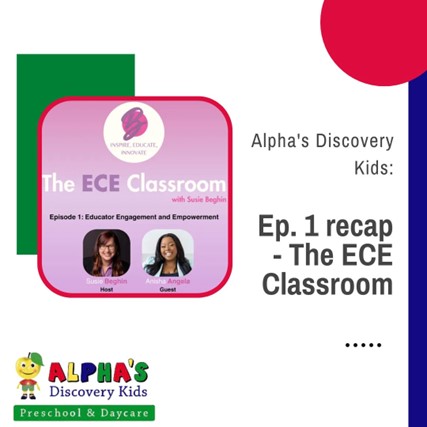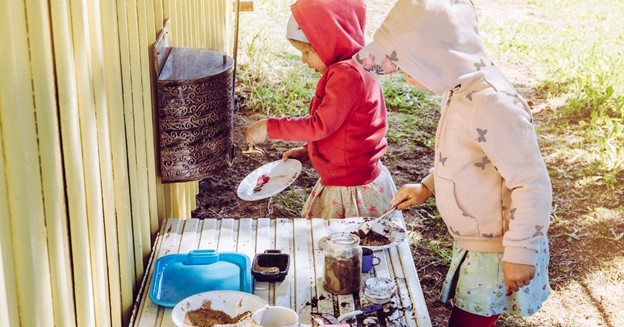Mindful Parenting: Promoting Calmness, Patience, and Connection with Your Children
Mindful Parenting: Promoting Calmness, Patience, and Connection with Your Children
by Susie Beghin, RECE, Founder of Alpha’s Discovery Kids
Have you ever spent hours scouring the internet for parenting tips, seeking solutions to the daily challenges and uncertainties you face? Parenting can often feel like an overwhelming task filled with constant demands and pressures. As a mother and an Early Childhood Education (ECE) educator, I empathize with these pressures firsthand. That’s why I believe mindfulness is so crucial, not only for children but also for us adults. From my conversations with many parents, I know that mindful parenting, which integrates calmness, patience, and a deep connection with our children, is of utmost importance.
Mindful parenting involves being fully present and engaged with your children, fostering a deep sense of awareness and connection. It’s about slowing down, appreciating the moment, and responding to your child’s needs with empathy and understanding. Mindfulness in parenting helps create a supportive environment where children feel valued, heard, and loved. This approach not only benefits the children but also promotes the well-being of parents, reducing stress and enhancing the overall family dynamic.
In this blog, I’ll share some tips that I hope you find helpful in incorporating mindful parenting into your daily life. These tips are designed to help you nurture calmness, patience, and a stronger connection with your children, fostering a positive and supportive family environment.

Tips to Promote Calmness
- Practice Self-Care: Before you can be present for your children, it’s crucial to take care of yourself. Ensure you are getting enough rest, eating well, and engaging in activities that rejuvenate you. Self-care isn’t selfish; it’s necessary for maintaining your well-being and being the best parent you can be.
- Breathing Exercises: Simple breathing exercises can help both you and your children manage stress and stay calm. Practice deep breathing techniques together, especially during moments of tension. Inhale deeply through the nose, hold for a few seconds, and exhale slowly through the mouth.
- Create a Calm Environment: Your home environment significantly affects your family’s mood and behavior. Keep your living space organized and clutter-free to create a sense of tranquility. Soft lighting, calming music, and incorporating natural elements can also contribute to a peaceful atmosphere.
Tips to Promote Patience
- Practice Mindfulness Meditation: Regular mindfulness meditation can help you develop greater patience. It trains your mind to stay focused on the present moment and reduces impulsive reactions. Even a few minutes of meditation each day can make a significant difference.
- Empathize with Your Child: When your child is acting out, try to see the situation from their perspective. Understanding their feelings and frustrations can help you respond with empathy rather than impatience. Remember, children are still learning how to navigate their emotions and the world around them.
- Set Realistic Expectations: Recognize that children are still developing their skills and may not always meet your expectations. Adjusting your expectations to their developmental level can reduce frustration and help you respond more patiently.
Tips to Promote Connection
- Engage in Shared Activities: Spend quality time with your children doing activities they enjoy. This could be reading together, playing games, or simply talking. Shared activities foster a strong bond and show your children that you value spending time with them.
- Listen Actively: Active listening involves giving your full attention to your child when they speak. Make eye contact, nod, and respond appropriately to show that you are engaged in the conversation. This practice helps your child feel heard and understood.
- Express Love and Appreciation: Regularly express your love and appreciation for your children. Positive affirmations, hugs, and kind words go a long way in building a strong emotional connection. Let your children know that they are loved unconditionally.
Mindful parenting is a journey that requires practice and patience, but the rewards are profound. By incorporating mindfulness into your parenting approach, you can promote calmness, patience, and a deep connection with your children. Remember to take care of yourself, practice empathy, and engage in meaningful activities with your children. These practices will help create a supportive and loving environment where your children can thrive.
For more insights and practical tips on fostering your child’s development through play and mindfulness, I invite you to explore my book, Learn to Play. It’s a comprehensive guide designed to help parents and educators provide the best start in life for their children.
By adopting these mindful practices, we can transform our parenting approach, ensuring that we raise happy, healthy, and well-rounded children.
Navigating the Transition: Helping an Older Sibling Adjust to a New Baby
Navigating the Transition: Helping an Older Sibling Adjust to a New Baby
by Susie Beghin, RECE, Founder of Alpha’s Discovery Kids
As both a mom and an early childhood educator, I understand the challenges families face when welcoming a new baby into the home. The arrival of a new sibling can be an exciting yet challenging time for older children, especially when it comes to adjusting to the changes in their daily routine and family dynamics. At Alpha’s Discovery Kids, we’re committed to supporting families at every stage of their journey, providing guidance and assistance to help children and parents navigate this transition with ease.
It’s not uncommon for children to experience a range of emotions during this time, and these feelings often manifest in their behavior at daycare. From regression in previously mastered skills to attention-seeking behaviors and separation anxiety, the changes happening at home can significantly affect a child’s behaviour and well-being in the daycare environment.
Here are five common observations we see in the daycare setting:
1.Child Regression in Skills:
- Children may regress in skills they’ve previously mastered. For example, a child who was once independent at nap time may suddenly need more help falling asleep.
2. Attention-Seeking Behavior:
- Some children may exhibit attention-seeking behavior in negative ways, such as whining, hitting, or biting, to garner more attention.
3. Separation Anxiety:
- Older siblings may experience strong separation anxiety at drop-off time, even if they’ve previously adjusted well to daycare.
4. Reluctance to Attend Daycare:
- Children may express a desire to stay at home with the parent rather than attending daycare.
5. Engagement in “Baby Talk”:
- Children may revert to “baby talk” even if they can speak in full sentences.

It’s crucial for parents to communicate these changes with their daycare teachers. Understanding the child’s situation at home enables us to provide the best support and assistance at daycare.
Here are some strategies you can try to help children adjust to the change:
Acknowledge the Child’s Feelings:
- Validating the child’s emotions is crucial. Let them know that it’s okay to feel sad, mad, or jealous about the new addition to the family. For example, you might say, “It’s hard to be a big sister! You sometimes feel sad or mad that mom and dad are busy with your little brother.”
Acknowledge Good Behavior:
- Children often seek attention, even if it’s negative. Instead of focusing on negative behavior, emphasize and praise positive behavior. For instance, you might say, “I like how you helped your little brother with his bath this morning,” or “I appreciate how you waited patiently for me to finish talking on the phone before you came to ask me something.” Specific praise encourages the child to repeat desirable behavior.
Avoid Making Big Changes:
- It’s advisable to avoid making other significant changes during this time. For instance, hold off on starting potty training or weaning. Minimizing changes can help the child adjust more smoothly.
Continue Treating the Child According to Their Age and Skill Level:
- If you notice regression in the child’s behavior, it’s essential to continue treating them according to their age and skill level. Offer opportunities for age-appropriate activities to help them build and maintain their skills.
With patience, understanding, and support, both parents and children can navigate this transition successfully. Enjoy this special time by spending extra one-on-one time with each other as well as quality time together as a family!
For video content on this topic and similar early childhood topics, visit our YouTube channel.
The ECE Classroom – Recap of Episode 1 – Educator Engagement and Empowerment
The ECE Classroom – Recap of Episode 1 – Educator Engagement and Empowerment
by Susie Beghin, RECE, Founder of Alpha’s Discovery Kids
“Your program is only as good as the educators who are delivering it.” – Susie Beghin
I am thrilled to have released our very first episode of “The ECE Classroom” podcast, where we focused on one of the most critical aspects of early childhood education: the educators. I wanted to take this opportunity to give a special shout-out to all the early childhood educators out there. Your hard work and dedication are truly appreciated, and this episode is dedicated to you.
During our episode, we discussed the importance of educator empowerment and engagement. I was honored to welcome a special guest, Anisha Angela, an early childhood education coach and expert with over 14 years of experience in the field. Anisha shared invaluable insights into the challenges educators are facing today, especially in light of the COVID-19 pandemic.
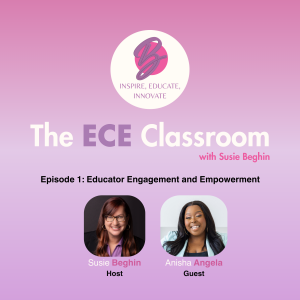
One significant issue we explored is the prevalence of burnout among educators. Anisha highlighted that the burnout experienced by educators today is not the usual nine-to-five fatigue; it runs much deeper and leaves educators questioning their purpose and feeling disconnected from their work.
As Anisha pointed out, burnout not only affects educators but also impacts the children in their care. When educators are burnt out, they may lack the creativity and energy needed to provide high-quality education and care to young children.
We also discussed the need for educators to adapt to a constantly changing environment. With the onset of COVID-19, educators had to navigate new norms and restrictions, often leading to feelings of uncertainty and stress. To address these challenges, we spoke about the importance of workplace harmony and the need for educators to support one another. Anisha emphasized that creating a dynamic team environment where personal and professional lives can coexist is essential for combating burnout and fostering a supportive workplace culture.
Anisha and I are both passionate about educator empowerment and engagement. We believe that reconnecting with one’s “why” is essential for early childhood educators to feel engaged, empowered, and valued in their roles. By reflecting on what initially drew them to the field of early childhood education, educators can rediscover their passion for their work.
A heartfelt thank you to Anisha for being our first guest on “The ECE Classroom” podcast. Stay tuned for more insightful discussions on early childhood education, parenting, and educator empowerment.
You can listen to the podcast on your favourite podcast platform, or by clicking here: https://spotifyanchor-web.app.link/e/OPl10EGzNIb
You can find Anisha on any of the following platforms:
Instagram: Your Early Childhood Coach✨
Facebook: AnishaAngella.co
X (formerly Twitter): AnishaAngella.co (@AnishaAngella)
Youtube: Anisha Angella
Website: www.anishaangellabooks.ca
General Email: info@anishaangellabooks.ca
Anisha(CEO) Email: anishaangellabooks@gmail.com
The ECE Classroom – New Podcast for early childhood educators
The ECE Classroom with Susie Beghin
by Susie Beghin, RECE, Founder of Alpha’s Discovery Kids
“Educators are the lifeblood of the early child care system.” – Susie Beghin
I am thrilled and excited to announce the launch of my brand new podcast, ‘The ECE Classroom with Susie Beghin.’ Dedicated to exploring key topics in early childhood education, each episode offers insightful discussions and practical advice and is designed to inspire, inform, and empower educators, home care providers, and parents alike. With my background in early childhood education and daycare ownership, I am passionate about nurturing young minds and supporting those who work tirelessly to shape the future generation.

In our inaugural episode, I am delighted to welcome Anisha Angela as our guest speaker. Anisha is an Early Childhood Education (ECE) coach and expert with over 14+ years of experience in the field. Her extensive background includes leadership roles in childcare programs, teaching positions at college programs, and overseeing multiple childcare locations as a senior manager.
As the CEO and Founder of “The Early Childhood Coach + Co,” Anisha is committed to supporting the success of fellow ECE professionals through consulting, coaching, and training. With her wealth of knowledge and experience, Anisha shares invaluable insights into the current challenges facing educators, including burnout and stress, and offers practical tips for reigniting the spark within the classroom.
We hope you’ll join us on this journey of learning and growth as we strive to support and uplift the early childhood education community.
Listen to the podcast here: https://spotifyanchor-web.app.link/e/OPl10EGzNIb
Connect with Anisha on her social channels to stay updated on her insights and upcoming events:
Instagram: @anisha.theecc
Facebook: @AnishaAngella.co
Twitter: AnishaAngella.co (@AnishaAngella)
Youtube: Anisha Angella
Website: www.anishaangellabooks.ca
General Email: info@anishaangellabooks.ca
Spring Adventures for Kids: Exploring Nature
Spring Adventures for Kids: Exploring Nature
by Susie Beghin, RECE, Founder of Alpha’s Discovery Kids
As spring blooms and nature comes to life, it’s the perfect time to engage children in outdoor activities that foster their curiosity and creativity. At Alpha’s Discovery Kids, we’re passionate about providing children with enriching experiences that ignite their love for learning and exploration. From nature walks to mud kitchens, there are endless opportunities for kids to connect with the natural world and unleash their imagination.
Nature walks are a favourite among children and educators alike and are an excellent way to connect children with the natural world while encouraging physical activity and curiosity. During these walks, children have the chance to explore various environments, from wooded trails to open fields, collecting treasures along the way.

Encouraging children to collect items such as pine cones, stones, leaves, and twigs not only sparks their curiosity but also provides materials for creative projects. These collected treasures can be used in art projects, where children can create nature-inspired collages, paintings, or sculptures, fostering their artistic expression and appreciation for the beauty of the natural world. Picking up sticks, in particular, seems to captivate children’s attention as they experiment with different sizes and shapes, imagining them as wands, swords, or tools for building.
Parents can also join in on the fun by taking their children on nature walks in local parks or trails. Equipped with a bag to gather their findings, children delight in the opportunity to explore the great outdoors and discover the beauty of nature firsthand. Nature walks also offer opportunities for hands-on learning experiences. Children can observe different plant and animal species, learning about their habitats, behaviours, and life cycles. Parents can also engage children in discussions about the importance of conservation and caring for the environment, instilling in them a sense of responsibility towards the planet.
Another highlight of outdoor play is the mud kitchen, a beloved feature that encourages imaginative play, sensory exploration and hands-on learning. With simple setups consisting of tables or flat surfaces, pots, pans, and utensils, mud kitchens provide children with endless opportunities to cook, bake, and create. As children mix, pour, and stir ingredients in their mud kitchens to concoct “delicious” meals and potions, children engage in open-ended play that fosters language development, motor skills, and social interaction.
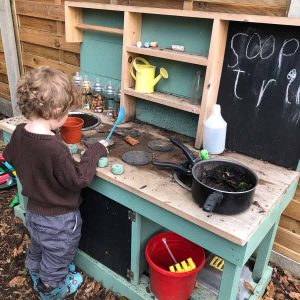
Mud kitchens have benefits beyond imaginative play. As children engage in sensory activities, they explore different textures, smells, and consistencies, enhancing their sensory processing skills. Mixing and stirring promotes hand-eye coordination and strengthens hand muscles, laying the foundation for writing and other fine motor tasks. The sensory experience of squishing mud between their fingers and the freedom to experiment with different textures and consistencies stimulates their senses and ignites their creativity. And, the outdoor setting provides children with the opportunity to engage in physical activity, promoting gross motor skills and overall well-being.
Additionally, mud kitchens offer rich learning experiences that integrate various academic disciplines including our 4 Pillars of Learning. Children naturally engage in scientific inquiry as they observe changes in materials and explore cause-and-effect relationships. Children can integrate elements of mathematics by counting, sorting, and categorizing natural materials or measuring quantities for their concoctions. They also exercise their creativity and artistic skills as they experiment with different combinations and designs, transforming mud and natural materials into works of art.
Whether exploring the wonders of nature on a walk or whipping up culinary delights in the mud kitchen, springtime offers abundant opportunities for children to learn, grow, and connect with the world around them. By embracing outdoor play and nature-based activities, we cultivate a sense of wonder and curiosity that will inspire children to explore and discover throughout their lives.
For more information, visit our YouTube channel for inspiration and ideas.
Parenting in the Digital Age: Screen Time
Parenting in the Digital Age: Screen Time
by Susie Beghin, RECE, Founder of Alpha’s Discovery Kids
Parenting in the digital age can feel like navigating uncharted territory. As a parent and the owner of Alpha’s Discovery Kids, I am acutely aware of the complexities involved in raising children in an era dominated by technology. In our rapidly evolving world, where digital devices are part of our everyday lives, finding the right balance between harnessing the benefits of technology and safeguarding against its potential drawbacks is crucial. At Alpha’s Discovery Kids, we prioritize creating an environment where children can thrive emotionally, socially, and intellectually while also recognizing the role that technology plays in their lives. Striking this balance is essential as we help guide children through their formative years.
One of the most pressing concerns for parents is managing screen time limits. With smartphones, tablets, and other digital devices becoming increasingly prevalent, children are spending more time than ever in front of screens. This is why it’s so important to focus on creating a balance between embracing technology for educational purposes and ensuring children have ample opportunities for real-world experiences and interactions. After all, children learn best through play so we want to make sure we are encouraging them to participate in activities such as outdoor play, social interactions and creativity.

Quality of content is another major consideration for parents navigating the digital landscape. With countless apps, games, and digital platforms available to children, it’s essential to curate content that is not only entertaining but also enriching, age-appropriate, and safe. Parents must discern between educational content that fosters learning and critical thinking skills and potentially harmful or addictive material. It’s equally important to make sure that the digital content aligns with family values and educational goals – just one more layer of complexity to the decision-making process!
The impact of technology on children’s social and physical development also cannot be overlooked. Excessive screen time has been linked to a sedentary lifestyle, which can contribute to a decline in physical activity and overall well-being. Additionally, prolonged use of digital devices can sometimes replace face-to-face interactions, affecting children’s social skills and emotional development.
Despite these challenges, we believe that technology can be a valuable tool when used appropriately. At Alpha’s Discovery Kids, we incorporate technology into our curriculum in a way that enhances learning experiences and fosters creativity, striving to provide children with opportunities to engage with technology in meaningful ways.
We also encourage open communication about technology. By discussing the benefits and potential drawbacks of technology with children, parents can help them develop healthy digital habits and make informed choices about their screen usage.
Ultimately, parenting in the digital age requires a thoughtful and proactive approach. By creating a balance between technology and real-world experiences, setting clear guidelines for screen time, and fostering open communication, parents can help their children navigate the digital world safely and confidently. At Alpha’s Discovery Kids, we are committed to supporting parents in this journey and providing children with the tools they need to thrive in today’s digital age.
For more information on early childhood topics, follow Susie Beghin’s YouTube channel where she delves deeper into these topics.
Fostering Early Literacy: Strategies to Inspire a Love of Reading
Fostering Early Literacy: Strategies to Inspire a Love of Reading
by Susie Beghin, RECE, Founder of Alpha’s Discovery Kids
Did you know that the foundation for a lifelong love of reading is laid in the earliest years of childhood?
As an Early Childhood Educator and a mother, I am deeply passionate about fostering a love for reading from an early age. At Alpha’s Discovery Kids, we are always exploring natural ways to incorporate language and literacy into our play-based approach to learning. After all, research indicates that the peak ability to learn occurs between the ages of 0 to 6 years, so building strong literacy skills in the early years is crucial for a child’s overall development. The key is incorporating various strategies to make learning enjoyable and effective.
Teaching literacy through free play is one of the most effective ways to engage children and foster a love for reading, and something we do every day at Alphas Discovery Kids! By creating a “print-rich” environment, we surround children with written words and labels that correspond to everyday objects. For example, labeling items with both a picture and written word helps children make associations between the spoken word and its written form. Whenever we engage with these labeled items during work time, we point out the written word, reinforcing the connection between spoken language and print.
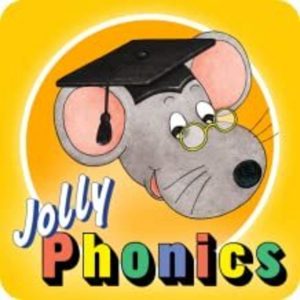
In addition to labeling, we use Jolly Phonics songs as a fun and engaging way to develop associations between letter sounds and letter names. Singing alphabet songs or rhymes helps children become familiar with the sounds of letters while providing a memorable and enjoyable experience.
When it comes to reading books, we believe in making the experience interactive and engaging. Instead of simply reading aloud, we encourage children to participate by asking them questions about the story and what they think will happen next. This not only promotes critical thinking skills but also encourages children to actively engage with the text and develop comprehension skills.
We can also empower children to tell their own stories by interpreting pictures on a page or creating their own narratives based on the illustrations. This encourages creativity and imagination while also strengthening language and storytelling abilities.
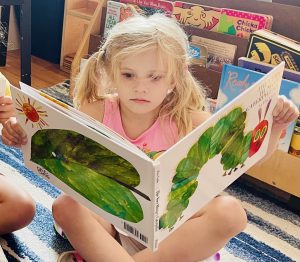 Intentional literacy activities can be tailored to suit children at different stages of development. For infants, daily read-aloud sessions provide valuable opportunities for brain development and foster a sense of curiosity about the world. As children transition into the toddler stage, tactile activities such as using alphabet magnets or drawing letters in sand help introduce them to the alphabet in a hands-on way. A quick tip is to start with 5 to 7 letters and gradually add more as children learn. This ensures that they can build upon their knowledge at a pace that suits them.
Intentional literacy activities can be tailored to suit children at different stages of development. For infants, daily read-aloud sessions provide valuable opportunities for brain development and foster a sense of curiosity about the world. As children transition into the toddler stage, tactile activities such as using alphabet magnets or drawing letters in sand help introduce them to the alphabet in a hands-on way. A quick tip is to start with 5 to 7 letters and gradually add more as children learn. This ensures that they can build upon their knowledge at a pace that suits them.
For preschoolers, we introduce the alphabet scavenger hunt as a fun and interactive way to reinforce letter recognition and early literacy skills. Children are encouraged to search for objects that begin with specific letters, promoting active engagement and exploration while strengthening their understanding of the alphabet.
By incorporating these strategies into our curriculum at Alpha’s Discovery Kids, we aim to instill a lifelong love for reading and learning in children from a young age. By making literacy fun, interactive, and accessible, we empower children to become confident and enthusiastic readers, setting them up for success in school and beyond.
For more information about this and other early childhood education topics, check out our YouTube videos.
Embracing Winter: Battling the Blues
Embracing Winter: Battling the Blues
by Susie Beghin, RECE, Founder of Alpha’s Discovery Kids
As we get to the end of February in a cold climate, it’s not uncommon for adults to find themselves grappling with the winter blues. Unlike children, many adults shudder at the thought of heading out into the frigid temperatures. Paired with the often grey skies, winters can be a struggle for many people. However, at Alpha’s Discovery Kids, we believe that with a mindful approach, parents can not only navigate but also turn the winter season into a time of warmth, connection, and family well-being.
Here’s some tips to help battle those winter blues:
- Outdoor Adventures:
Many adults look at winter as a period of hibernation. But venturing outdoors, even in colder temperatures, can significantly impact your mood and overall well-being. Make it a family affair—whether it’s building snow forts, taking a winter hike, or engaging in a friendly snowball fight, these outdoor activities offer an excellent way to bond with your children while boosting everyone’s spirits.
- Dress for the Occasion:
Don’t let the chill keep you indoors. Equip yourself and your family with the appropriate winter gear. Bundle up in layers, ensuring warmth and comfort during your outdoor excursions. The simple act of dressing for the weather can make the outdoors more inviting, allowing you (and your children) to fully enjoy the wonders of the winter landscape.
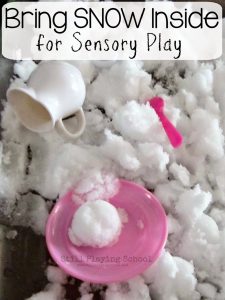
- Create a Winter Wonderland at Home:
Sometimes, the best adventures are closer than you think. Transform your home into a cozy winter haven. Get creative with indoor activities, exploring snow indoors (yes it’s possible), baking seasonal treats, or even having a family movie night with films that celebrate the magic of winter. By bringing the warmth indoors, you create a nurturing environment that counters the chill outside.
- Mindful Moments:
Winter provides a unique opportunity for mindfulness. Encourage quiet moments of reflection, perhaps by the fireplace or with a warm cup of cocoa. Incorporate mindfulness practices into your routine, such as deep breathing or simple meditation. These moments of calm can be grounding, fostering a sense of peace and emotional well-being.
- Stay Connected:
Winter blues often come with a sense of isolation. Combat this by staying connected with friends and family. Plan winter-themed gatherings or virtual meet-ups. Building a sense of community, even from a distance, can alleviate feelings of loneliness and contribute to a more positive winter experience.
- Plan for Physical Activity:
Physical activity is a powerful tool in combating the blues. Plan regular exercise sessions, whether it’s indoor workouts, winter sports, or simple stretching routines. Not only does this boost your mood, but it also sets a positive example for your children, instilling the value of staying active even during the colder months.
By taking a proactive and family-centered approach, parents can turn the winter season into a time of connection, joy, and shared experiences. At Alpha’s Discovery Kids, we recognize the importance of family well-being, and we encourage parents to see the beauty and warmth that winter can bring when approached with a positive mindset. Let this winter be a season of togetherness, creating lasting memories that your family will cherish.
For more information and early childhood tips, follow Susie Beghin on YouTube.
Susie Beghin: Education Thought Leader
Exciting News! I’m Taking Education Thought Leadership to New Heights!
by Susie Beghin, RECE, Founder of Alpha’s Discovery Kids
As we enter the new year, I am beyond thrilled to share some fantastic news with you. As many of you know, I’m the proud owner of Alpha’s Discovery Kids and the author of ‘Learn to Play: The Four Pillars Learning System.’ Today, I’m stepping into a new chapter of my journey and expanding my thought leadership into a fresh digital space. Welcome to my new website and social media channels!
Why Education Thought Leadership?
As I reflect on my roles as a mother, entrepreneur, and author, each hat I wear adds a layer to my unique perspective on early childhood education. This journey has given me a wealth of insights and experiences that I’m incredibly eager to share with you in a more immersive and engaging way.
These new platforms are your one-stop destination for everything related to early childhood education. From practical advice for parents and educators to fun and educational activities for little ones, I’m committed to sharing my knowledge and experiences with you.

I’m also happy to advise that I’m now available for speaking opportunities! I’d love to connect with you through conferences, webinars, and events. Recently, I had the pleasure of participating in the ECE Virtual Summit on January 13, where we delved into the captivating worlds of STEAM learning and mindfulness, discussing how to integrate these vital elements into the early years and beyond.
I’m looking forward to connecting with each one of you in this amazing community we’re building. Follow me on my new channels, and let’s create a community dedicated to nurturing young minds. I’m genuinely thrilled to share my wisdom and insights and look forward to embarking on this educational journey together—where every child’s potential is not just nurtured but celebrated!
For more information, check out my new social channels and subscribe/follow:
https://www.tiktok.com/@susie.beghin.
www.instagram.com/susie.beghin
https://www.facebook.com/profile.php?id=61554788521421
www.linkedin.com/in/susie-beghin
Winter Activities for Kids: Keeping Kids Active and Engaged
Winter Activities for Kids: Keeping Kids Active and Engaged
by Susie Beghin, RECE, Founder of Alpha’s Discovery Kids
As a mother and early childhood educator, I have witnessed the transformative influence that offering children a well-rounded educational journey can have. And at Alpha’s Discovery Kids, our commitment to giving children the best start in life is embodied in our 4 Pillars of Learning. These pillars, including Language & Literacy, STEAM, Physical Activity & Nutrition, and Mindful Awareness, form the foundation for providing children with the best start in life.
Among these pillars, Physical Activity & Nutrition hold a special place. It’s not merely about keeping young bodies in motion; it’s a holistic approach that nurtures the mind and promotes overall well-being. Even during the winter months, when the cold might tempt us to stay indoors, incorporating physical activity remains key.

Cold weather doesn’t have to mean a halt to outdoor play. At Alpha’s Discovery Kids, we recognize the importance of engaging children in physical activities, even when the temperature drops. The benefits of physical activity extend far beyond the obvious physical advantages. While it undoubtedly promotes physical health by enhancing bodily functions, building strength, and supporting the development of bones and muscles, its impact on mental and emotional health is equally significant. Physical activity has been shown to elevate mood, reduce stress, and foster a positive mindset from an early age.
And although, as adults, we don’t always enjoy heading out into the cold, most children tend to love it! Winter provides unique opportunities for physical activities that are not only enjoyable for children but also contribute to their development. Sledding, snowball fights, and building snowmen are not just recreational; they enhance gross motor skills, encourage teamwork, and promote creativity. These activities keep kids active and contribute to their social and emotional growth.
In addition to outdoor play, indoor physical activities are equally important during the winter. Parents play a pivotal role in encouraging physical activity at home, especially when outdoor play might be limited. On days when heading outdoors is challenging, there are numerous indoor activities that you and your child can enjoy, all with household items you likely already have. Here are a few ideas:
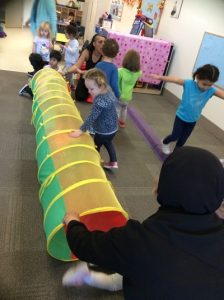
- Magical boxes – Provide your child with a large box and witness its transformation into fire trucks, tunnels, or a fantastic canvas for painting.
- Pillow paradise – Pillows can be more than just for resting. Try crafting an obstacle course or a cozy pillow fort for endless fun.
- Dance party extravaganza – Discover music the whole family enjoys and let loose with a dance party. It’s a fantastic way to get everyone moving and grooving.
- Scavenger hunt quest – Get creative with hiding spots and organize an entertaining scavenger hunt.
- Family flex– Engage in easy stretching exercises suitable for the entire family. It’s a great way to stay active and flexible.
These indoor activities not only keep your children physically active but also incorporate elements from the STEAM pillar (Science, Technology, Engineering, Art, and Math). Building a pillow or blanket fortress enhances engineering skills, and using a box as a canvas introduces artistic elements. Beyond the physical benefits, these activities stimulate young minds and foster a love for learning.
As winter sets in, don’t let it dull the sparkle of your kids’ activity. Integrating physical activity into their routine, even during the colder months, has a profound positive impact. The key is to make it fun and seamlessly woven into daily life. So, let’s embrace the winter wonderland and ensure that, even in the cold, our children are active and engaged.
For more early childhood education tips , check out my YouTube videos.



